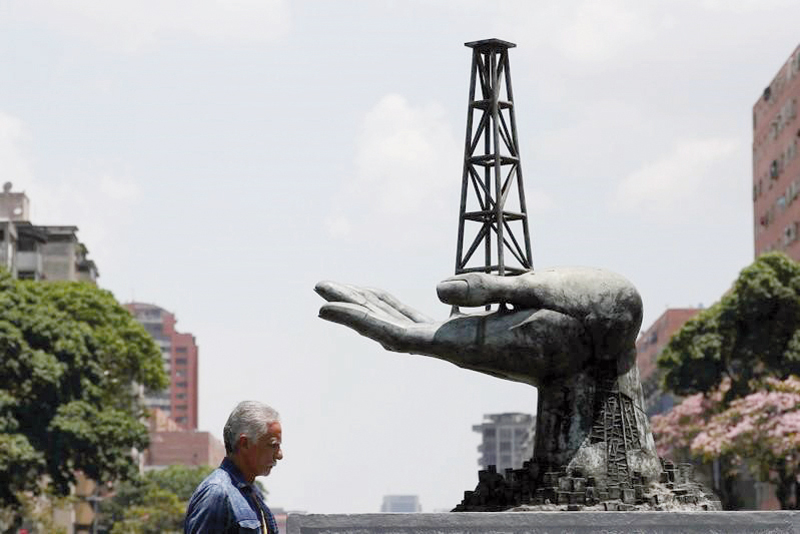

CARACAS: Foreign joint venture partners with Venezuelan state-owned oil company PDVSA are concerned the latest set of US sanctions on the South American country could disrupt their operations, three industry sources said.
The Trump administration last week froze all Venezuelan government assets in the United States and US officials ratcheted up threats against companies that do business with Venezuela.
That has raised fears for those companies that the United States will make good on threats to sanction individual firms, and also that banks will limit transactions just to avoid the risk of sanctions as well, the sources said.
The White House imposed sanctions on Venezuela’s oil industry in January in an effort to oust socialist President Nicolas Maduro, whose re-election in 2018 is viewed by much of the Western Hemisphere as illegitimate.
The executive order issued on August 5 did not explicitly sanction non-US companies that do business with PDVSA, including partners in crude operations like France’s Total SA, Norway’s Equinor ASA and Spain’s Repsol SA, as well as Russian and Chinese customers.
However, the order threatens to freeze US assets of any person or company determined to have “materially assisted” the Venezuelan government.
Similar language was included in sanctions in January, but US national security adviser John Bolton said last week that the newest measures mean companies have a choice between doing business with Venezuela or the United States.
“If they really want to do what Bolton says that he wants to do, which is to get these firms to stop doing business with Venezuela, they’re going to show that they mean it, they’re going to have to punish somebody,” said Francisco Rodriguez, a Venezuelan economist at Torino Economics in New York and former adviser to opposition presidential candidate Henri Falcon.
Total and Repsol did not respond to requests for comment.
An Equinor spokesman said that the company had no comment on the new sanctions and was “compliant with any limitations and/or sanctions that would apply to our business in Venezuela.”
The latest measures do not go as far as Washington’s sanctions on Iran’s oil sector, which expressly prohibit foreign countries from purchasing Iranian crude.
Still, sanctioning companies that do business with PDVSA, known as secondary sanctions, could hamper Venezuela’s oil industry, analysts said. More than half of current crude production comes from joint ventures between PDVSA and foreign partners.
The January sanctions blocked US firms from importing Venezuelan oil and US dollar transactions with PDVSA, accelerating a long-standing decline in the OPEC member’s oil industry. Venezuela shipped about 933,000 barrels per day (bpd) in July, down from almost 1.5 million bpd in the three months before sanctions.
One industry source said PDVSA’s partners and customers may request clarity on the order from the US Treasury Department, or even request explicit waivers to ensure their activities do not run afoul of regulations.
The source said companies were concerned about potential over compliance by financial institutions unwilling to risk sanctions by approving operations linked to PDVSA, complicating their ability to pay suppliers and contractors. That could cause oilfield activity to slow.
While transactions in dollars linked to PDVSA or its joint ventures remain banned, the European Union has not prohibited operations in euros. Nevertheless, many banks are not authorizing euro bank accounts to firms associated with PDVSA or transactions that can ultimately be tracked to it, which has left the state-run firm with frozen money all over the world. — Reuters
Oman Observer is now on the WhatsApp channel. Click here



